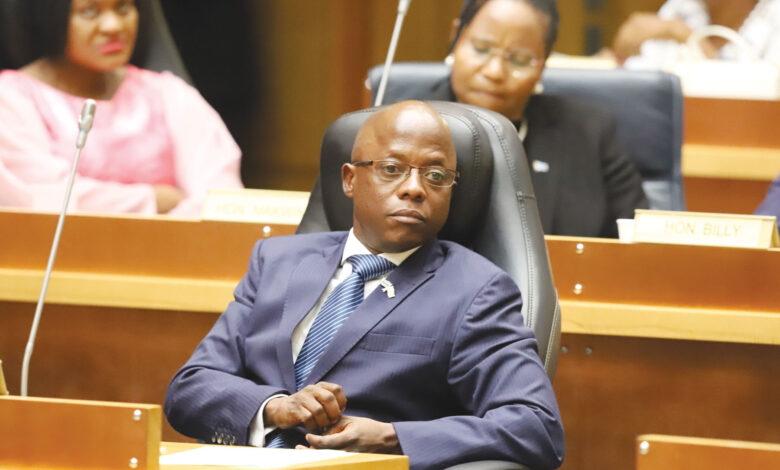News
Economic Inclusion Bill 2021 Presentation By Honorable Mmusi Kgafela

Economic Inclusion Bill 2021 Presentation by Honorable Mmusi Kgafela.
“Honourable members,
I wish to present to you the Economic Inclusion Bill of 2021. You will recall that on 26 July 2021, I read the Bill for the first time. Therefore, today, it will be read for the second time.
Honourable members,
Let me give the background to the Bill. Your will recall that sometime towards the end of 2019, His Excellency the president, made a pronouncement to put in place an empowerment Law. Consequently, stakeholder and public consultations and requests for proposals were commenced through all forms of media. I am glad that these engagements paid off as I am informed that close to eighty written submissions were received. Furthermore, my Ministry has engaged with the Finance, Trade and Economic Development Committee of Parliament as well as Business Botswana and other stakeholders. I must say, all those who have contributed to the development of this law have been supportive throughout, and it is worth commending them.
Honourable Members,
Government has in the past, put in place a number of initiatives strategies and programmes, including among others, Localization Policy, Reservation Policy, and Preferences under Public Procurement. All these efforts were aimed at addressing skills gaps, enabling citizen participation in the economy as well as empowering participation by citizens by securing or reserving certain percentages of works in various projects. Ladies and Gentlemen, you will recall that in 2012, the Citizen Economic Empowerment Policy was approved. This policy sought to, among other things, promote citizen participation in the development and growth of the economy, promote social cohesion and harmony, maximize potential in human capital residing in Botswana as well as to address both absolute and relative poverty. All these were to be achieved through the development of skill and knowledge for citizens to realize their full potential, and through the development of skills and knowledge for citizens to realise their full potential and capacity building for private sector growth.
Moreover, it would be through infusing entrepreneurial culture to promote global competitiveness. However, the evaluation of the Citizen Economic Empowerment (CEE) Policy in 2018 revealed that implementation of citizen empowerment initiatives has remained inadequate; and its success was minimal due to challenges with regards to coordination and lack of enforcement of existing laws which cut across different sectors. Following evaluation of the CEE Policy, there has been increased advocacy for the enactment of a Citizen Economic Empowerment Legislation to, among others things;
• Putting in place the institutional set-up and mechanism to facilitate implementation of the empowerment initiatives, programmes and strategies;
• Strengthen enforcement of the citizen economic empowerment initiatives to ensure economic inclusion and meaning participation of targeted citizens in the development and growth of the economy;
• Address the need for clarity, uniformity, and alignment in the application of citizen economic empowerment initiatives and programmes;
• To further ensure compliance, foster accountability and to ensure ease of monitoring and Evaluation of CEE initiatives.
Honourable Members,
The request to draft the Citizen Economic Empowerment (CEE) Law was approved in August 2019. As defined in the Constitution defeats the objectives of the promulgation of the CEE Law, whose main purpose is to ensure economic inclusion and meaningful participation of targeted citizens in the development and growth of the economy. Hence proposal to name the law, the Economic Inclusion Law, and to define “Targeted Citizen” as a person whose economic resources has been constrained due to various factors as may be determined (such as gender, educational background, economic status, disability, and age) and other thresholds.
The objective of the Economic Inclusion Bill, 2021 is therefore, to establish the Economic Inclusion Office with the primary mandate of promoting effective participation of the targeted citizen in economic growth and development. Having laid down the background to the Bill, I wish to proceed to discuss the various Parts of the Bill. There are a total of 14 parts that constitute the Bill.
Part 1 of the Bill lays out preliminary provisions which include:
• The Short Title of the Act and commencement;
• Interpretation of terms used; as well as
• The sectors of the economy to which the Act shall apply.
Part II, Provides for the establishment of the Economic Empowerment Office; appointed of the Coordinator, as well as the functions of the Office. The functions include, among others:
• Promoting the economic empowerment of targeted citizens;
• Overseeing and coordinating implementation of the relevant existing economic empowerment laws, initiatives and programmes;
• Ensuring an integrated, coordinated and uniform approach to economic empowerment;
• Furthermore, ensuring the promotion and facilitation of ownership of income generating activities and assets by targeted citizens
• Strengthening the ability of a targeted citizen to own, manage and control a private sector enterprise and productive assets.
Part III: Deals with entrenchment of Citizen Empowerment in Social and Economic Measures and speaks to:
• Opportunities to own productive land and property;
• Prohibiting transfers, allotting, or issue or transfer of any portion of private sector enterprise owned and controlled by a targeted citizen to a non-citizen;
• Facilitating increased access to economic activities, infrastructure and skills development;
• Ensuring equitable representation at Board and management level in the workplace;
• Facilitating partnership between Government agencies and the private sector to enhance capacity building of targeted citizens;
• Implementing programmes and laws to combat fronting or corruption.
Part IV: Deals with enhancing Global Competitiveness through Empowerment and Partnerships and transforming the Economy to be Private Sector Led:
This part deals with building capacity for private sector growth and infusing entrepreneurial culture to promote global competitiveness for targeted citizens, through the creation of an environment which:
• Is aggressive in targeting global leaders in selected economic growth areas; and
• Increases the share of Gross Domestic Product (GDP) attributable to private sector; thereby reducing Government contribution to GDP.
Part V: Entitled Procurement and Licensing to Promote Empowerment provides for empowerment of targeted citizens through promotion of production and consumption of locally made goods and services by both Government and the private sector, through among others:
• Providing opportunity for targeted citizens to do business with the State;
• Preferential treatment of preferential procurement to targeted citizens owned enterprises;
• Introduction of legal instruments for production and procurement of local products, work and services: as well as providing mandatory monitoring of running tenders to ensure no diversion of commitment after award of tender.
Part VI: Speaks to using Budgeting Process in Support of Empowerment:
• Indicting a percentage of their budget set aside for procurement of locally made goods, works and services, and agricultural produce;
• Allowing for unsolicited bids to promote innovation and creativity for targeted citizen youth.
In part VII of the Bill, we deal with: training of a targeted citizen hence we emphasise lifelong learning education and in here, we seek to align the education system to the job market. While in Part VIII we recognize that non-state Actors have to play a role in the delivery of public sector programmes and we seek to ensure that empowerment programmes and entrepreneurship development to not only point to Government and its agencies, but to all, including the private sector and those that have the compulsion or obligation to play a part in economic development and growth. We recognize the importance of mentorship and sharing of knowledge and also emphasis the need for foreign investors to empower targeted citizens through value chains and other measures.
Part IX: is on Social Upliftment Programmes that ensure nobody is left behind. It provides for everyone, including the private sector and non-governmental organisations to have a role to play in empowering all targeted citizens and citizen owned enterprises in the society and communities. Localizing some procurement activities, setting targets for admission of targeted citizens in tertiary education devoting part of the profit to social investment of communities comprising disadvantaged targeted citizens; and adhering to a point-based system aimed at empowering businesses owned by youth, women and people with disabilities.
Part X: Funding for Economic Empowerment Initiatives; This part provides for financiers to design sustainable and more robust funding for growing citizen owned small, medium and micro enterprises (SMMEs) through:
• Designing and adopting successive programmes of subsidies, reservation and preference schemes;
• Leveraging finance to enable the targeted citizen to take strategic stakes in major projects; as well as
• Creating investments for floating in the Botswana Stock Exchange.
Part XI: Access to information, Technology and Markets: This part provides for a public body to be responsible for facilitating access to information, technology and markets. Thereby, supporting targeted small, medium and micro enterprises (SMMEs) to harness an innovation an innovative and creative approach to improve productivity quality products and services, competitiveness and enhance market access. Ladies and Gentlemen, the last part, but one is:
Part XIII: on Offences and Penalties: This part provides for offences and penalties, where there is, among others:
• Misrepresentation of compliance status;
• Provision of false information; and
• Engagement in corrupt practices.
Finally, Part XIV: Miscellaneous Provision: This provides for the Minister to make Regulations to enable implementation of the Law.
Part XII: is on Compliance with Economic Inclusion Law: Regular published reports on economic empowerment. Laying charges, after investigations, against persons, public bodies or private enterprises for non-compliance.
I Thank you”.





